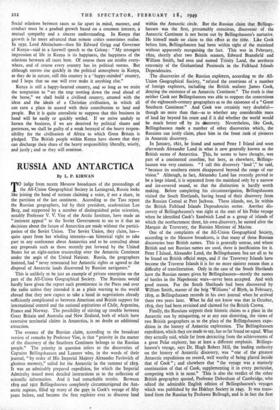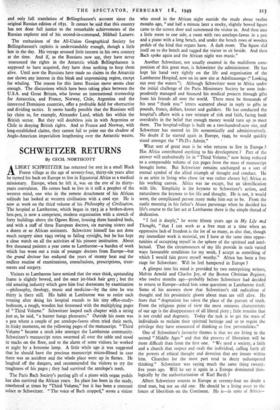RUSSIA AND ANTARCTICA
By L. P. KIRWAN
TO judge from recent Moscow broadcasts of the proceedings of the All-Union Geographical Society in Leningrad, Russia looks like joining the band of nations claiming a voice, if not a share, in the partition of the last continent. According to the Tass report the Russian geographers, led by their president, academician Leo Berg, and supported by a number of distinguished polar scientists, notably Professor V. V. Vise of the Arctic Institute, have made an "insistent appeal" to the Soviet Government to see to it that no decisions about the future of Antarctica are made without the partici- pation of the Soviet Union. The Soviet Union, they claim, has— quite apart from her whaling interests—an historical right to take part in any conference about Antarctica and to be consulted about any proposals such as those recently put forward by the United States for an eight-nation trusteeship over the Antarctic Continent under the aegis of the United Nations. Russia, the geographers insisted, had " never renounced her Antarctic rights or agreed to the disposal of Antarctic lands discovered by Russian navigators."
This is unlikely to be just an example of private enterprise on the part of the All-Union Geographical Society. The Russians would hardly have given the report such prominence in the Press and over the radio unless they intended it as a plain warning to the world abroad that they now expect to take a hand in negotiations already sufficiently complicated as between American and British support for international control and the national aspirations of Chile, Argentina, France and Norway. The possibility of stirring up trouble between Great Britain and Australia and New Zealand, both of which have extensive territorial claims in Antarctica, is no doubt an additional attraction.
The essence of the Russian claim, according to the broadcast version of remarks by Professor Vise, is that " priority in the matter of the discovery of the Southern Continent belongs to the Russian people." The priority in question refers to the discoveries of Captains Bellingshausen and Lazarev who, in the words of their journal, "by order of His Imperial Majesty Alexander Pavlovich of glorious memory," sailed for the Antarctic in the summer of 1819. It was an admirably prepared expedition, for which the Imperial Admiralty issued most detailed instructions as to the collection of scientific information. And it had remarkable results. Between 1819 and 1921 Bellingshausen completely circumnavigated the Ant- arctic regions, filled -up many of the gaps in Cook's voyage of fifty years before, and became the first explorer ever to discover land
within the Antarctic circle. But the Russian claim that Bellings- hausen was the first, presumably conscious, discoverer of the Antarctic Continent is not borne out by Bellingshausen's narrative. He himself made no claim to this effect at the time. Like Cook before him, Bellingshausen had been within sight of the mainland without apparently recognising the fact. This was in February, -182o, shortly after two British seamen, Edward Bransfield and William Smith, had seen and named Trinity Land, the northern extremity of the. Grahamland Peninsula in the Falkland Islands Dependencies.
The discoveries of the Russian explorers, according to the All- Union Geographical Society, "refuted the assertions of a number of foreign explorers, including the British seafarer James Cook, denying the existence of an Antarctic Continent." The truth is that neither Cook nor Bellingshausen was able to support the contentions of the eighteenth-century geographers as to the existence of a " Great Southern Continent." And Cook was certainly very doubtful— though no more than that—as to whether any considerable mass of land lay beyond his route and if it did whether the world would be much better off by its discovery. Nevertheless, like Cook, Bellingshausen made a number of other discoveries which, the Russians can justly claim, place him in the front rank of pioneers in Antarctic discovery.
In January, 1821, he found and named Peter I Island and soon afterwards Alexander Land in what is now generally known as the British sector of Antarctica. This, he seems to have thought, .was part of a continental coastline, but here, as elsewhere, Bellings- hausen was very cautious. " I call this discovery ' land '," he said, " because its southern extent disappeared beyond the range of our vision." Although, in fact, Alexander Land has recently proved to be a large island, it is separated from the mainland only by a narrow and ice-covered sound, so that the distinction is hardly worth making. Before completing his circumnavigation, Bellingshausen visited the South Shetlands, having heard of their discovery from the Russian Consul at Port Jackson. These islands, too, lie within the British Falkland Islands Dependencies sector. Another dis- covery of Bellingshausen's was right at the start of his Polar voyage when he identified Cook's Sandwich Land as a group of islands of which the northernmost three, his own discovery, he named after the Marquis de Traversey, the Russian Minister of Marine.
One of the complaints of the All-Union Geographical Society, according to the Moscow broadcasts, is that many of these Russian discoveries bear British names. This is generally untrue, and where British and not Russian names are used, there is justification for it. Peter I Island, Alexander Land, the Bellingshausen Sea are all to be be found on British official maps, and if the Traversey Islands have become the Traverse Islands ills for no more sinister reason than a difficulty of transliteration. Only, in the case of the South Shetlands have the Russian names given by Bellingshausen—mostly the names of battles in the Napoleonic wars—never been accepted. And with good reason. For the South Shetlands had been discovered by William Smith, master of the brig ' Williams ' of Blyth, in February, 1819, as. Bellingshausen records in his own journal when he arrived there two years later. What he did not know was that in October, 1819, they had been revisited and claimed for the British Crown.
Finally, the Russians support their historic claims to a place in the Antarctic sun by misquoting, or at any rate distorting, the views of two British geographers as to the place of the Bellingshausen expe- dition in the history of Antarctic exploration. The Bellingshausen expedition, which they are made to say, has so far found no equal. What they actually said, while far from detracting from the achievements of a great Polar explorer, has at least a different emphasis. Bellings- hausen's voyage, says Dr. Hugh Robert Mill, the leading authority on the history of Antarctic discovery, was "one of the greatest Antarctic expeditions on record, well worthy of being placed beside that of Cook " ; and elsewhere that " the voyage was a masterly continuation of that of Cook, supplementing it in every particular, competing with it in none." This is also the verdict of the other British geographer quoted, Professor Debenham of Cambridge, who edited the admirable English edition of Bellingshausen's voyages which was published by the Hakluyt Society in 1945- It was trans- lated from the Russian by Professor Bullough, and is in fact the first and only full translation of Bellingshausen's account since the original Russian edition of 1831. It cannot be said that this country has not done full justice to the remarkable achievements of the Russian explorer and of his second-in-command, Mikhail Lazarev.
The enthusiasm of the All-Union Geographical Society for Bellingshausen's exploits is understandable enough, though a little late in the day. His voyage aroused little interest in his own country at the time. And if, as the Russians now say, they have never renounced the rights in the Antarctic which Bellingshausen is supposed to have acquired, they have done nothing to keep them alive. Until now the Russians have made no claims in the Antarctic nor shown any interest in this bleak and unpromising region, except for whaling. The reason for this latest Russian move seems clear enough. The discussions which have been taking place between the U.S.A. and Great Britain, who favour an international trusteeship for Antarctica, and France, Norway, Chile, Argentina and the interested Dominion countries, offer a profitable field for obstructive and dividing tactics. It seems hardly possible that the Russians will lay claim to, for example, Alexander Land, which lies within the British sector. But they will doubtless join in with Argentina or Chile in denying British rights. And to France and Norway, with long-established claims, they cannot fail to point out the shadow of Anglo-American imperialism lengthening over the Antarctic wastes.







































 Previous page
Previous page